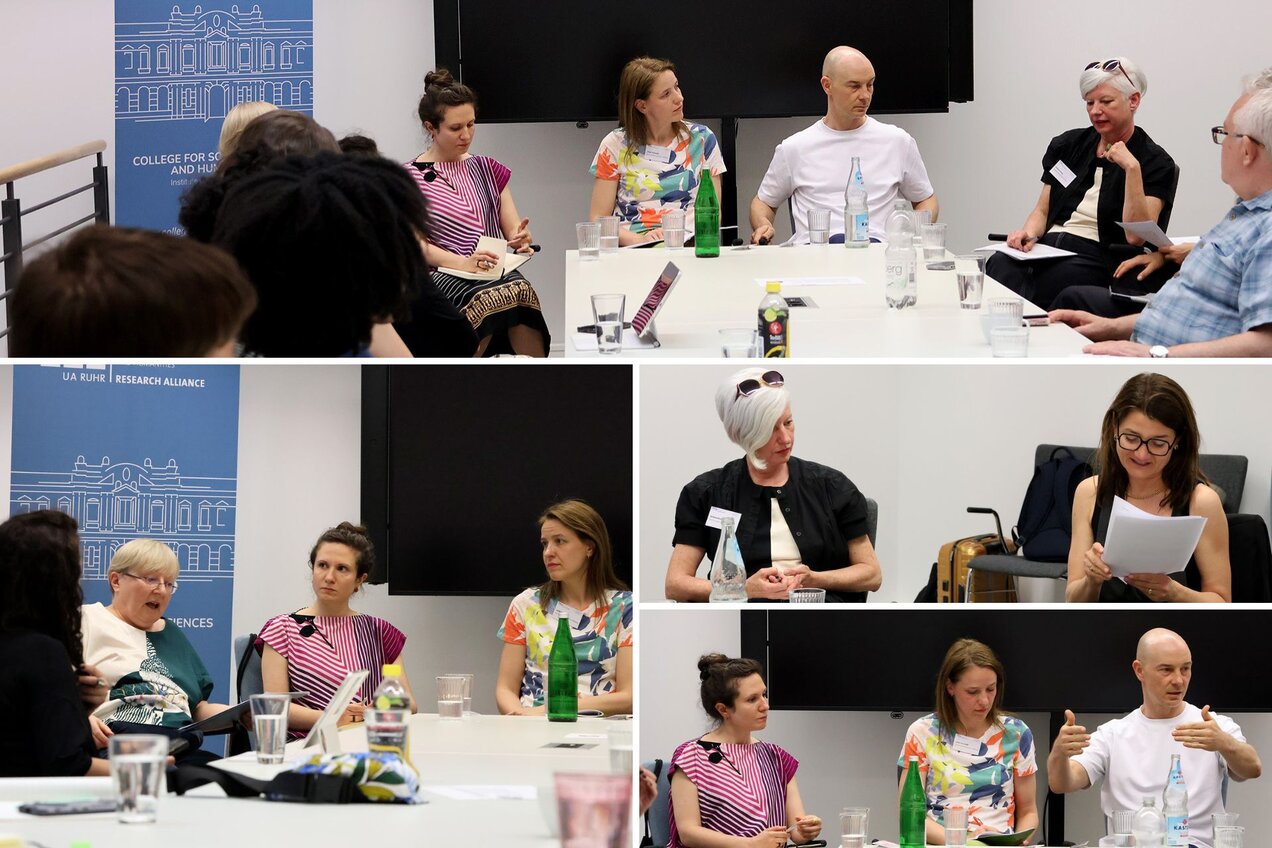
25/06/2024
The old dream that plastic would improve the world, which has turned into fear of a world awash in plastic waste, is one of many failed projects of modernity. The panel discussion “Waste as a By-Product of Modernity” on 14 May 2024 focused on how artistic and discursive projects and practices could help us “unmake” waste by looking for an alternative modernity to counter the naturalised binaries which still produce disposable materials, bodies, and ways of living.
Małgorzata Sugiera, professor of performativity studies from the Jagiellonian University in Cracow (Poland) and current Senior Fellow at the College for Social Sciences and Humanities, hosted the two-day event “Performing Waste” on 14 and 15 May 2024 together with her tandem partner Dorota Sajewska, professor of performance studies at Ruhr University Bochum.
 ©
College UA Ruhr
©
College UA Ruhr
What qualifies as “waste”, actually – and who defines that? With this only seemingly profane question, the panel discussion on 14 May opened. In the Anthropocene, a simple definition as “discarded, expelled or excess matter” seems rather insufficient to account for a multi-layered concept. In modernity as "a civilization of excess, redundancy, waste and waste disposal" (Zygmunt Bauman), we speak not only about industrial or radioactive waste, but also about wasted lives, lifeworlds and people.
The panelists discussed the implications of waste as a normative concept: in modern consumerist societies, the practice of wasting, of disposing of things for the sake of simplicity, it was argued, is being normalised. Advancing technology allows excessive production and acceleration. At the same time, the (post-)modern subject is invoked not to waste time and not to waste their lives, to use resources efficiently, which leaves us trapped in a contradiction.
Addressing the political and ethical dimensions of waste, Dorota Sajewska outlined that the creation of value depends on the creation of non-value, as implied in Michael Thomson’s book “Rubbish Theory” (1979). Hence the concept of waste is always intertwined with questions of status and power, and connected with changing social systems. Referring to studies by environmental humanities scholar Simone Müller, it was pointed out that the increase in global waste trade, for instance, is made possible only by exporting waste to countries of the Global South, which can be regarded as a form of colonialist practice.
What is discarded for which reasons actually tells a lot about a society and culture. In research, the “leftovers” of a certain age and social system can be meaningful in the sense of material legacies and “sediments of lived lives and history” that can be analysed, for example with regard to the socialist political system of the former GDR. What is being preserved in archives, and what, on the other hand, is being left out?
Moreover, scholars are also addressing (digital) memory practices: facing toxic and nuclear waste, societies must find a language and cultural techniques for dealing with long-term waste.
Małgorzata Sugiera on her motivation to examine the problem of waste from the perspective of performativity studies:
"My increasing interest in performativity and the performative potential of waste has been stimulated by both a sudden realisation of how many names we need to categorise, sort out, or simply depict waste and a simple follow-up question of why we need so many ways to name what has been wasted, what may lie there hidden from a common view. What is more, you may speak not only about things that are damaged, no longer useful and, therefore, have to be thrown away, or deposited somewhere for a rainy day. There are also wider social, economic, political, cultural, and material systems of discarding as a way to produce and maintain power. In other words, our research project "Performing Waste" deals as much with artistic works and projects as it does with ecological, economic and political matters."
 ©
eventfotograf.in
©
eventfotograf.in
How do contemporary artists approach the problem of waste, and how does working with waste as an artistic material change our understanding of art and aesthetics? Artists can display the paradox we face in the practical impossibility of discarding, as the material will remain, even after we have tried to get rid of our waste.
It was argued that it is not the role of the arts to find solutions, but rather to open up a “space of speculation”. The artist Mierle Laderman Ukeles for instance, in her feminist performances in the 70s and 80s, realised the idea of Maintenance Art, washing and cleaning public spaces herself and thus bringing people from the sanitation sector into the field of visibility. In doing so, she did not only raise awareness of human labour in cleaning and maintenance, but also incited to look intensely at the larger waste management system in New York City at the time.
Dorota Sajewska on the question how the arts, specifically performative arts, can contribute to a more reflective and mindful approach to practices of wasting in society:
"Performative arts not only represent the precariousness of the environmental catastrophe of anthropogenic origins, but also experiment with what life may be like in the wastelands. The greatest potential of arts which have been interested in anthropogenic changes is, therefore, to design new forms of relationalities, to transcend scientific objectivity and to practice collective ways of knowing and understanding a post-catastrophic world. In this way, arts can become a performative response to the systemic challenges of our age of ecological destruction."

Małgorzata Sugiera and Dorota Sajewska are currently working on a multi-authored volume, tentatively entitled “Performing Waste: To Re-Member Pasts and Fabulate Futures”, that will be published in the spring 2025. It intends to introduce the state-of-the-art critical research on both waste and wasting to a broad readership, particularly of graduate and postgraduate students, doctoral candidates and young scholars. All of the fifteenth authors, junior and senior scholars from German, Polish and Swiss academia, propose carefully selected case studies of contemporary performative practices in both everyday life and culture/arts across a wide gamut of media and genres. They offer new examples of wasting practices and their (re)presentations as well as novel and slightly different vistas onto topics and issues already taken up in better-known English-language studies, casting new light on them to inspire further discussions.